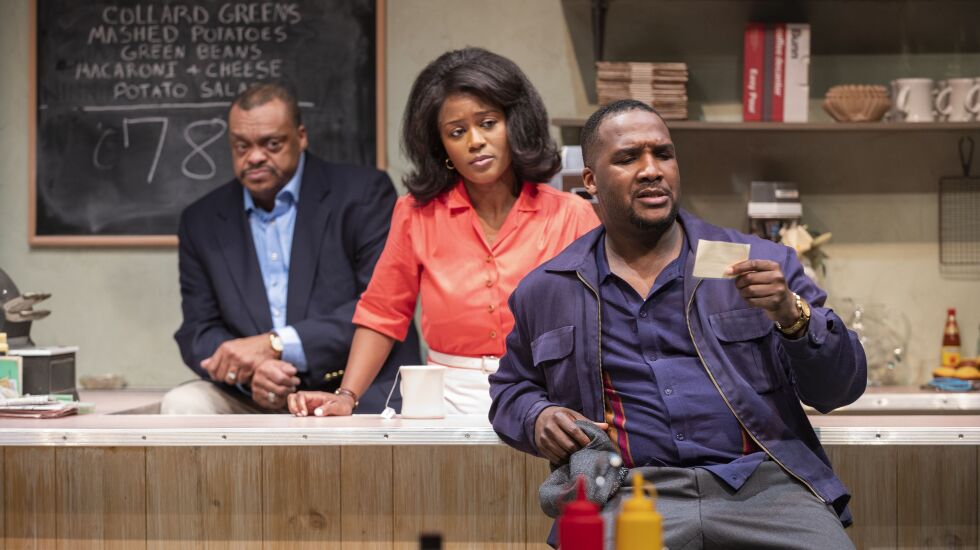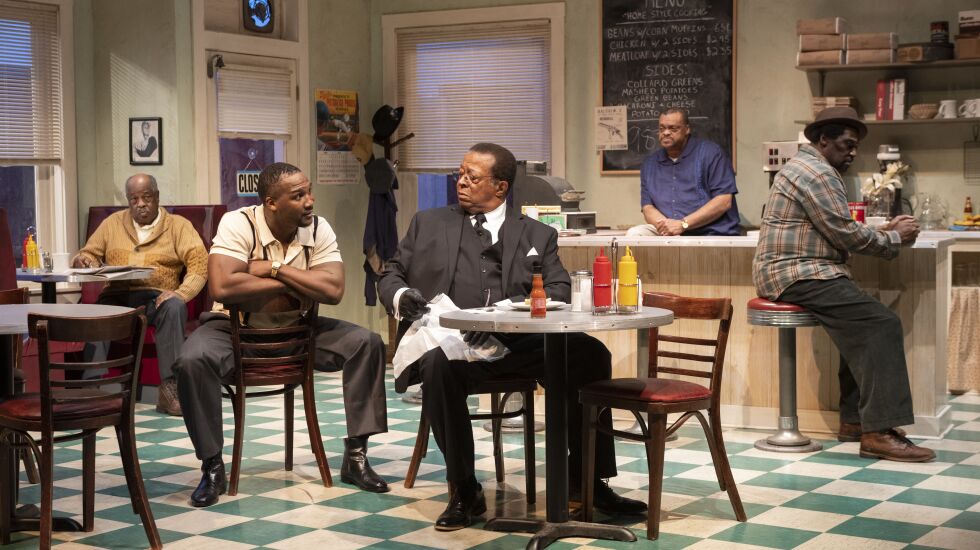
First produced in 1990 and set in 1969, August Wilson’s play “Two Trains Running,” now being revived at the Court Theatre, provided the very first mention of Aunt Ester. She would become the most crucial, over-arching character of Wilson’s masterpiece 10-play cycle depicting the African-American experience in the 20th Century. We just didn’t know it yet.
Here, she’s offstage but essential. The character Holloway (a likable Alfred H. Wilson), an unemployed housepainter-dash-philosopher and regular at a run-down Pittsburgh diner set for demolition by the city, urges recently released ex-con Sterling (Jerod Haynes) and others to, “Go see Aunt Ester. Just tell her you ain’t right with yourself and she’ll straighten you out.”
And she will, if only the characters can interpret her parables correctly. Which, alas, most don’t.
It’s interesting that Wilson first raised Aunt Ester — a personification of the connection of Black Americans to a larger, African past — when he took on the 1960s. Rather than miring the play in the intense politics of the time, this is, thematically, one of his more existential and symbolic rather than political plays.
Yet it’s also, stylistically, one of his more realistic ones, with a diffuse set of personal plotlines. Recently separated diner owner Memphis fights with the city over how much he’ll receive for the eminent domain expropriation of his building. Sterling tries to woo waitress Risa (Kierra Bunch) with a rally remembering the assassinated Malcom X treated as an excuse of a date. Wolf (Ronald L. Conner), who runs numbers to make a living, worries about where he can use the phone and about upsetting his bosses. From West (Cedric Young), the black-clad undertaker and richest man in town, we learn what the government pays for a “welfare casket” and specific costs of upgrades. The troubled Hambone (Joseph Primes, bringing a unique cheeriness to the role), is obsessed with collecting a ham as payment for work he did a decade earlier.
By focusing on the more mundane and also bringing a broader historical perspective, Wilson captured how the hope of the young was met by the weariness of those who had seen it all before. This too, he seemed to be saying, shall pass — and did pass. Both the good and the bad. Just don’t let your self-worth be determined by what others will pay.
That mix of realism and spiritualism, the psychological and the mythic, sure is a tough balance to find.
Directed by Ron OJ Parson, a strong Wilson interpreter, this is, unfortunately, not the clearest-eyed production of “Two Trains Running.” It feels somewhat perfunctory, a collection of performances within the realm of a generic realism.

These gaps show up most blatantly in the design work, including a set design that includes detritus on the ground in front the of the raised stage. It likely represents the future demolished diner, but it feels very much a disconnected after-thought. The sound design includes the unnecessary but terrific (sizzles in the half-visible kitchen) and the essential but inadequate (the sound of glass shattering at a pivotal moment is muddy and should be fixed).
The fine actors here capture the musicality of Wilson’s individual monologues, but there’s a lack of overall shape to rising and falling action. And when the lights suddenly change for a romantic scene between Sterling and Risa towards the end, one has to wonder why other moments — such as Memphis’ pivotal aria about his past in Mississippi — weren’t provided a similarly expressionistic treatment.
That said, I’m finding more and more to treasure in this play as it ages, and with age I bring a different perspective to it. It’s a hallmark of rich art that you can re-visit and appreciate it anew, and for different reasons. The bigger picture quality of this play really comes through more for me than it ever has. “There are always and only two trains running,” wrote Wilson of the play. “There is life and there is death. Each of use rides them both.”
As a coincidental bit of symbolism, this production will close at the Court Theatre on June 12. Later that same evening, the Court Theatre will collect the just-announced Regional Theatre Tony Award. The recognition of the theatre’s history and positive contributions to our culture has been well-earned.







